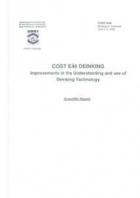
Digital Land Mobile Radio Communications - First Annual Report

Vesicular Arbuscular Mycorrhizas - Report of 1992 Activities

Fernmeldewesens zum thema "phasengesteuerte gruppenstrahler"

Diagnosis of Urban Water Supply and Wastewater Infrastructure - Proceedings

Activity Report - Agriculture - Biotechnology and Oceanography 1995-1996

Jahresbericht

Technische und wirtschaftliche veraussetzungen fûr den einsatz von elektro-strassenfahrzeugen

Verbal and Nonverbal Communication Behaviours
- Pages: 325
- Author(s): A. Esposito, M. Faundez-Zanuy, E. Keller and M. Marinaro
- Publisher(s): Springer
- http://www.springerlink.com/content/978-3-540-76441-0/
This book constitutes the thoroughly refereed post-proceedings of the COST Action 2102 International Workshop on Verbal and Nonverbal Communication Behaviours held in Vietri sul Mare, Italy, in March 2007.
The 26 revised full papers presented together with one introductory paper comprise carefully reviewed and selected participants’ contributions and invited lectures given at the workshop. The papers are organized in topical sections on verbal and nonverbal coding schema, emotional expressions, gestural expressions, analysis and algorithms for verbal and nonverbal speech, as well as machine multimodal interaction.

COST E46 DEINKING: Improvements in the Understanding and Use of De-inking Technology - Scientific Report
Proceedings of the Meeting “Improvements in the Understanding and Use of De-inking Technology”, which took place in Grenoble, France on 11-12 October 2006.
